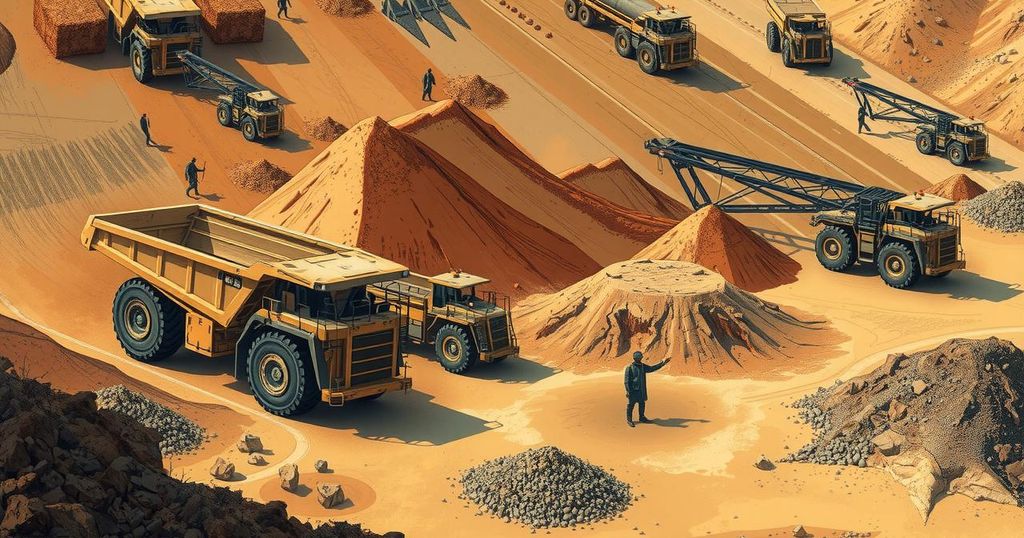Global news
AFRICA, CORRUPTION, DEMOCRATIC REPUBLIC OF THE CONGO, EUROPE, FELIX TSHISEKEDI, GEOPOLITICS, INTERNATIONAL RELATIONS, MARCO RUBIO, NATIONAL SECURITY, NEW YORK TIMES, NORTH AMERICA, PIERRE KANDA KALAMBAYI, THE NEW YORK TIMES, TRUMP, TS, TSHISEKEDI, UNITED STATES, US, US STATE DEPARTMENT
Isaac Bennett
0 Comments
Analyzing the Proposed U.S.-DR Congo Mining Agreement Amidst Regional Unrest
The Democratic Republic of the Congo (DRC) is initiating discussions with the Trump administration regarding a potential mining deal to gain U.S. support against M23 rebels and Rwandan forces. This prospect, highlighted by Congolese President Tshisekedi, may allow the U.S. access to DRC’s vast mineral resources. Concerns about transparency and the implications for Congolese governance are prevalent as the situation evolves.
Congolese authorities are engaged in preliminary discussions with the Trump administration regarding a potential agreement on the Democratic Republic of the Congo’s (DRC) extensive mining resources. The DRC, rich in critical minerals essential for modern technologies, seeks U.S. support against the M23 rebels and Rwandan forces that are creating instability in the eastern region. Specific terms of the negotiations are not yet clear.
In a conversation with the New York Times, Congolese President Felix Tshisekedi highlighted the existing Western interest in accessing his country’s mineral wealth, which is currently dominated by China. He expressed hopes that a partnership with the U.S. could lead to enhanced security and stability for the DRC, particularly in light of ongoing conflicts.
Further proposing a strategic partnership, a letter to Secretary of State Marco Rubio, commissioned by a Congolese senator, suggests U.S. operational control of a deep-water port, access to mineral reserves, and military training for Congolese forces. These proposals aim to strengthen DRC defense against foreign militant groups.
Experts express skepticism regarding the feasibility of U.S. military involvement as it contrasts with prior commitments made by President Trump to reduce military engagement abroad. Nonetheless, the Congolese government acknowledges its military’s vulnerabilities and seeks increased international pressure on Rwanda to support their own security.
Concerns regarding transparency in negotiations arise, with local experts warning that political motives may overshadow economic benefits for the DRC. Calls for parliamentary oversight of any potential agreements underscore the importance of ensuring public interest in the resource negotiations. Congolese officials assert that their aim is to regain control over mineral exports currently exploited by foreign entities, particularly Rwanda.
The discussions with the U.S. occur amid heightened scrutiny towards Rwanda’s involvement in the DRC’s resource exploitation, with recent U.S. sanctions targeting Rwandan officials linked to the M23. This marks a notable shift in U.S. policy towards Rwanda, a change that Congolese officials hope will facilitate their own strategic negotiations.
Tshisekedi’s outreach to the U.S. is perceived as a strategic pivot away from reliance on China, which dominates the DRC’s mining sector. There is skepticism, however, regarding whether U.S. companies can compete effectively with the Chinese, given the current absence of American mining firms in the DRC and the complex political and economic landscape.
Despite the challenges, there are indications of a growing dialogue between Congolese and U.S. officials. This includes plans for appointing a special envoy tasked with exploring mineral deals in the region. As negotiations progress, the Congolese government remains hopeful that they can redirect their mineral wealth towards stabilizing their nation while reducing reliance on foreign exploitation.
The potential U.S.-DR Congo mining agreement reflects both a strategic approach to securing Congolese resources and a broader geopolitical maneuvering in Central Africa. Amid ongoing instability and external pressures, the DRC seeks to leverage its rich mineral wealth for economic resilience and military security. However, the outcome of negotiations will significantly depend on transparency, collaboration, and the balance of interests between international partners and local needs.
Original Source: www.france24.com




Post Comment